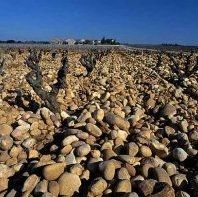2007 Côtes du Rhône-Villages

From £4.24 and 950 yen.
For Bastille Day, a French wine of course. Those who have followed my raves about Châteauneuf-du-Pape 2007 and the southern Rhône generally in this obligingly ripe vintage will know I have a very soft spot for almost any 2007 from such appellations as Châteauneuf, Gigondas, Vacqueyras, Rasteau, Beaumes-de-Venise, Vinsobres, and of course both the basic one, Côtes du Rhône, and the distinctly better one, Côtes du Rhône-Villages, from dozens of named villages in the southern Rhône with a proven track record for good quality.
I urge you to look out for 2007 reds carrying any of these appellations. They are highly likely to have impressive concentration and ripeness but without being baked or flabby. Coolish nights in the summer of 2007 kept the wines fresh. Some of the smarter ones may still taste a bit chewy, but at the level of Côtes du Rhône or Côtes du Rhône-Villages, the cheaper ones should provide great value drinking over the next year or two, or possibly three.
This week's specific recommendation is Asda, Extra Special 2007 Côtes du Rhône-Villages. I apologise to all those who do not live in the UK or Japan (where it's available in Walmart stores) but this is too good a bargain to ignore. I tasted it last month when looking at a range of very mixed wines from this powerful Walmart-owned British supermarket (see What's worth buying at Asda). Their chief wine buyer is a fellow Master of Wine, Philippa Carr, and they make much of her on the back labels, where 'Philippa says...'. I was very impressed by it at the regular price of £4.74 but from last weekend for two weeks it has been reduced to a ridiculous price of £4.24.
All the major British supermarket chains have their supposed superior own-label bottling. Tesco have Finest* (sic). Sainsbury's have Taste the Difference, or 'TTD'. Extra Special is Asda's equivalent. This blend of 60% Grenache, 20% Syrah, 10% Mourvèdre and 10% Cinsault was put together expressly for Asda by Caves St-Pierre, the big southern Rhône operation owned by Skalli of Sète (who also own St Supery in Napa Valley incidentally). They claim that they have instigated a specific quality regime with their growers, insisting on a maximum yield of around 48 hl/ha (the legal maximum is 42 hl/ha in theory, but there is always that extra 20% that the French tend to negotiate), a maximum level of pesticide residues (not something we really want to think about, folks, is it?) and recommending an optimal ratio of leaf  area to number of bunches. Grapes are deliberately not picked in the heat of the day to stop the grapes fermenting in uncontrolled conditions on the way to the winery.
area to number of bunches. Grapes are deliberately not picked in the heat of the day to stop the grapes fermenting in uncontrolled conditions on the way to the winery.
What I liked about this wine was its rich spiciness and the fact that it is not overburdened with dry tannins, while being unmistakably from this beautiful rocky, lavender-scented western corner of Provence. What I didn't like about it was its extremely naff bottle and label and its nasty synthetic cork. I would drink this particular wine this year – it is fashioned for current drinking and I am always nervous about how long plastic corks keep air out. It would be great with a barbecue.
I actually preferred it to Asda's much more expensive Gigondas and Châteauneuf. It just has great balance and appeal, and not massive alcohol (13.5%) for this sun-baked part of the world. It won a Bronze medal at this year's International Wine Challenge, apparently. I am not at all surprised.
Become a member to view this article and thousands more!
- 15,423 featured articles
- 274,424 wine reviews
- Maps from The World Atlas of Wine, 8th edition (RRP £50)
- The Oxford Companion to Wine, 5th edition (RRP £50)
- Members’ forum
- 15,423 featured articles
- 274,424 wine reviews
- Maps from The World Atlas of Wine, 8th edition (RRP £50)
- The Oxford Companion to Wine, 5th edition (RRP £50)
- Members’ forum
- Commercial use of our Tasting Notes
